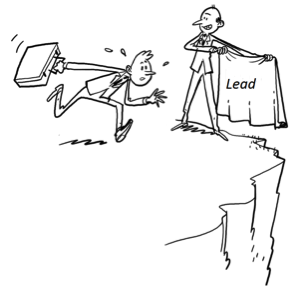 If you are not in charge of your Sales Process your forecast will be no more than guesswork and you will lose opportunities that you thought you were going to win. The truth is most Sales People do not take charge of the Sales Process. The really worrying thing is – they think they do.
If you are not in charge of your Sales Process your forecast will be no more than guesswork and you will lose opportunities that you thought you were going to win. The truth is most Sales People do not take charge of the Sales Process. The really worrying thing is – they think they do.
Perception vs. reality
When we ask workshop participants to complete a pre-course questionnaire one question is designed to see how confident they are about taking charge of the Sales Process. In most cases their answer reflects a high degree of confidence that they are in charge. But when we start working through an opportunity they are currently working on (we always use real live opportunities in our workshops) it becomes clear they are often not in the driving seat and the opportunity is by no means as certain as they thought.
The questionnaires have their place but in reality they only demonstrate the mismatch between perception and reality. There is only one way to effectively identify if you are really in charge of the Sales Process and I will come on to that later.
It happens to the best people
I just started working with a large international software company. Because of the growth in digital advertising, they have developed a new software product that will help marketing managers to improve the effectiveness of digital advertising and improve ROI. The best Sales People have been recruited, and the Business Unit Manager has excellent contacts in exactly the sort of companies they need to target. This is the way the Sales Process has been going so far.
The Business Unit Manager uses his contacts to get a first meeting with the Chief Marketing Officer of the target prospect, a company already spending a lot on online advertising. The CMO of the prospect company then invites a few relevant people along to this first meeting - this is when things start going out of control.
The CMO of the target prospect usually invites along people who are already managing online media space buying and using competitors’ software.
How the meeting generally goes
My client goes in with their team and makes a presentation to people they have never met before. The people invited by the CMO ask fairly aggressive questions about our client’s product because they are comfortable about the product they are using. They don’t get to meet the people who may have real points of pain.
They don’t get to ask questions about the strengths and weaknesses of the incumbent and they don’t get to find out who is really in the Buying Centre. But, because the prospect CMO has a relationship with my clients Business Unit Manager the team goes away with complimentary feedback and some to-dos. Then they go back to the office and enter the opportunity in CRM as qualified with a probability of 30%. But there is no commitment to a next step from the prospect and over the next few weeks interest fades.
Their pipeline is full of these supposedly qualified opportunities that are going nowhere. The sales forecasts are unreliable and the Business Unit Manager keeps having to go back to his internal investors and explain why the new business unit is failing to meet crucial milestones.
And this is how our workshop went
Everyone in the Sales Team along with the BU Manager came to the workshop. The Sales Team started out being pretty confident about their ability to achieve their targets but the BU Manager was much less happy. Understandably because he was responsible for a team of carefully chosen Sales Professionals who were going to meetings with excellent prospects but not closing deals.
We started looking at the Buying Centre in a key opportunity, one with a high probability of winning. I asked ‘who in the customer organisation has the most to gain from your product?’ The answer? Category and Product Managers. Then I asked if these were the people they were talking to? The answer? No.
This served to make the Sales Team think hard about exactly what they were doing and we started to make progress.
Then I asked them if it might not be better to start with a one-to-one meeting with the CMO of the prospect and explore the challenges and expectations of his internal customers.
How the Sales Process will go from now on
After the one-to-one meeting with the CMO the Sales Team will interview the people with the most to gain. Then they will replace the old “shooting-in-the- dark” presentation with a customer-specific one:
-
Point of Departure Our understanding of where you are today and what needs to be improved.
-
Point of Arrival Where you want to be in 18 months.
-
Transformation Roadmap a step-by-step plan for how to get from the Point of departure to the Point of arrival.
-
Business Case based on the questions asked in the interviews.
-
Project Approach The next steps to validate the proposed solution and the value proposition.
Our client has started to put this fully customer-specific approach in place. By taking charge of the Sales Process I am confident that the team will turn those excellent leads into real sales.
Time for an opportunity review
I mentioned earlier that you can use questionnaires to try and assess how confident a Sales Team is that they are in control of the Sales Process, but they don’t really work unless the team and the Sales leader have an unusual degree of self-reflection. So what can you do?
My recommendation is a detailed Opportunity Review with a well-qualified outsider. You can pay a consultant to do this or you may be able to ask a Sales leader from somewhere else in your organisation. You need someone to take a critical view of how your Sales Team is currently working in a real opportunity.
In my experience, more often than not, the review will reveal that the Sales Team is far less likely to be in charge than they think. This is a good starting point to get the Sales Process under control.
Questions you can ask yourself that will reveal how in control you are
-
Are your Sales forecasts at least 80% accurate?
-
Do you often make presentations without knowing the needs of most of the people in the room?
-
Could you describe what ‘in control’ looks like in your organisation?
Score yourself against 20 Success Factors with our B2B Selling Health Check:

